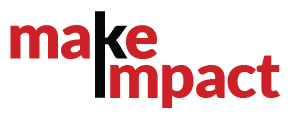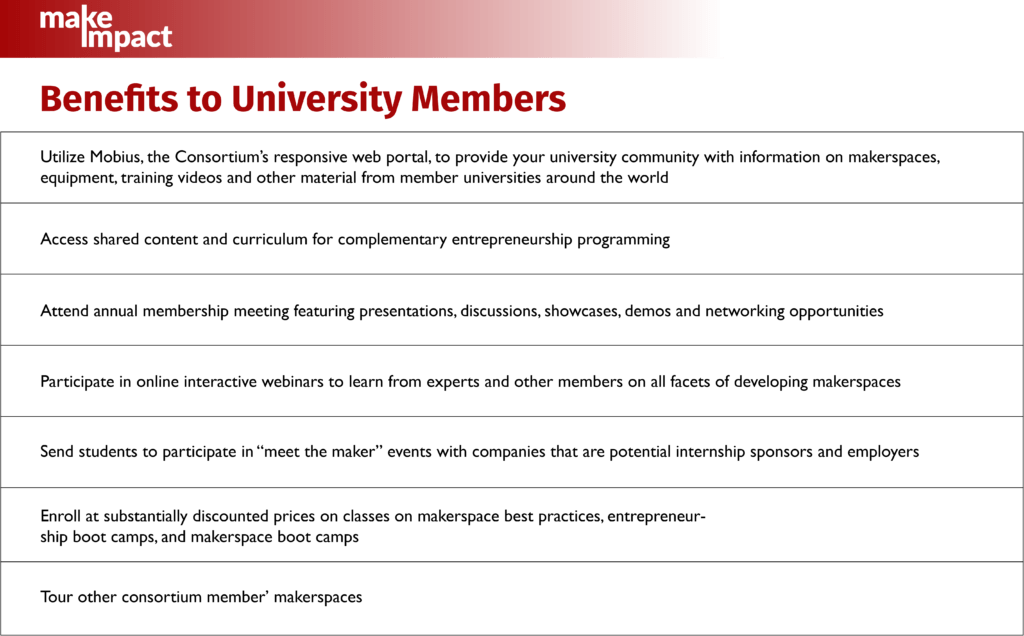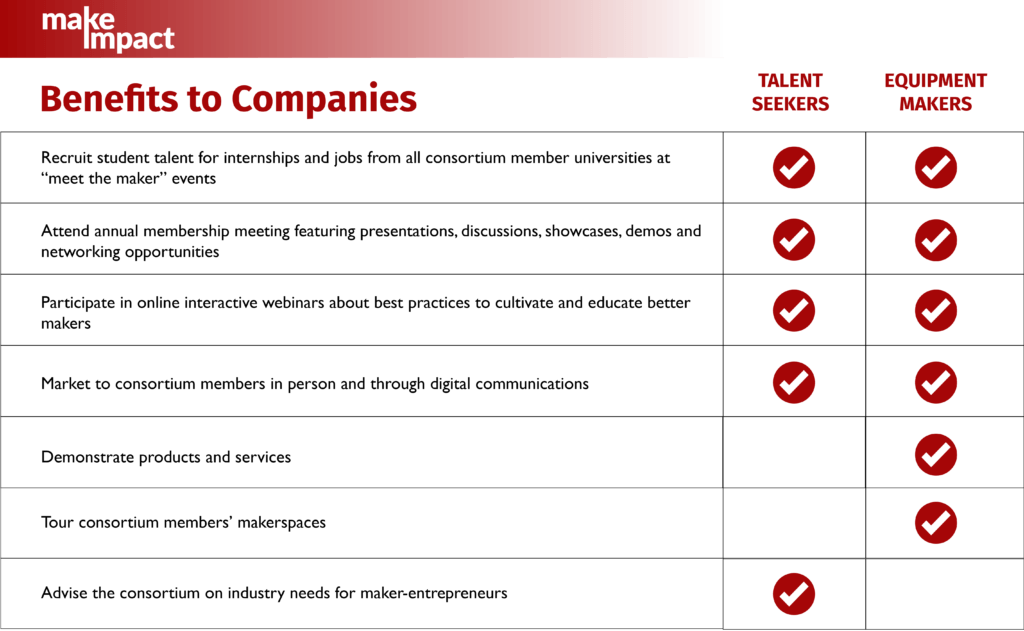The Make Impact Consortium is for universities, companies and public agencies who understand that technology innovation is first and foremost about people, and value the importance of joining a like-minded community for mutual learning and benefit.
For centuries, makers have made great entrepreneurs, inventors, and industry leaders. Making and entrepreneurship in the 21st century taps into these timeless activities. Just as computers have shrunk from room size to fit into our pockets, we can now have maker machines on our desks that previously were only found on factory floors. This made a difference because it allowed entrepreneurs to convert ideas into technological innovations. This marriage of making and entrepreneurship is in part what sparked the current maker revolution.
Making and entrepreneurship are more about culture and people than about facilities and equipment. On college campuses, many students are driven to develop their entrepreneurial skills and explore their creative ideas. Students from myriad backgrounds and interests are flocking to makerspaces to learn skills, meet other like-minded students, build things for classes and research projects, and explore new product ideas. Students become good at creating things for many reasons. They make impact if these reasons address real needs.
Makerspaces support the current trend in education of learning by doing. They provide students with resources to create rapid prototypes and multiple iterations, and encourage them to innovate by networking with others and forming teams within their community. Makerspaces are an important ingredient to the strong entrepreneurial ecosystem that students are looking for and future employers value. Universities recognize the value of enhancing their entrepreneurship programing, maker facilities and culture for the benefit of students, faculty, alumni, employers and the larger community and economy. This can extend beyond the university — impacting technology innovation ecosystems in cities and regions around the globe.
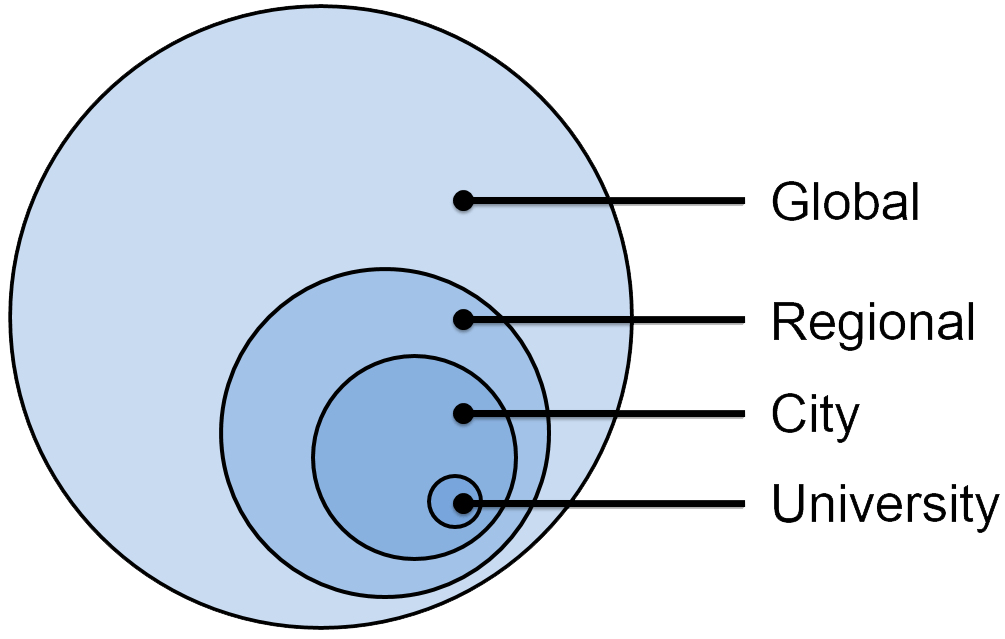
We will create a new means to radically augment key elements of innovation ecosystems — culture/community, human capital and infrastructure access. In parallel, we will work with our network of partners to influence other core elements — Policies, Industry and Finance.
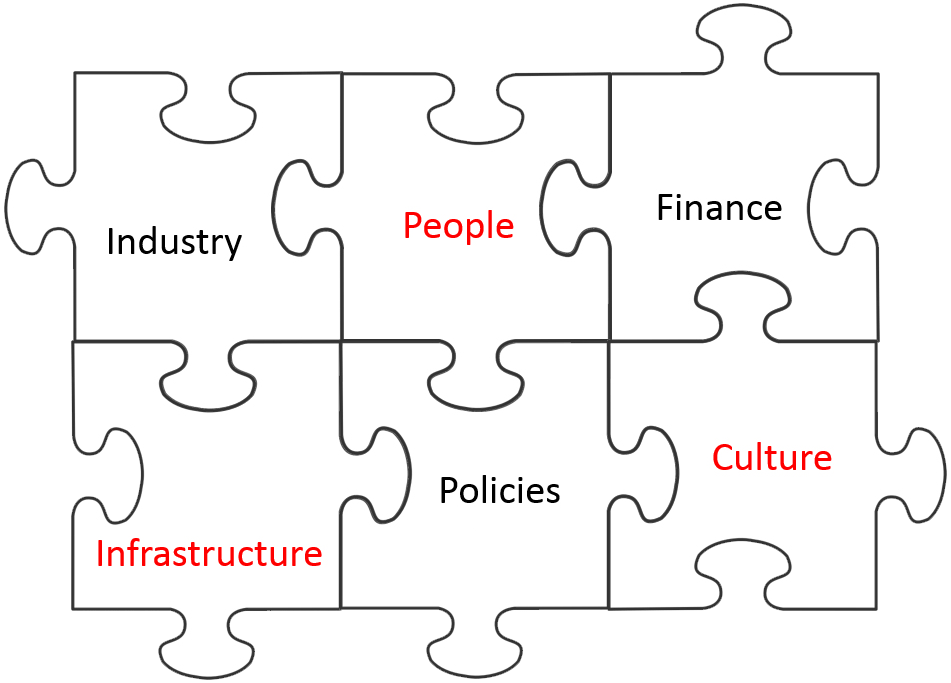
We invite you to explore membership opportunities and benefits:
UniversitiesMany universities desire to achieve or maintain a competitive advantage by cultivating a culture of making on campus to meet current student demand, attract talented prospective students, and broaden the innovation and entrepreneurship ecosystem on campus. They recognize the importance of students who know how to think, make, and do. Many universities learn the hard way that a room with machines is not necessarily a makerspace and alone doesn’t foster entrepreneurship. More is needed to make a vibrant ecosystem and the Make Impact Consortium’s Mobius platform will provide tools to fill in the gaps.
Founding members of the Make Impact Consortium will have the unique opportunity to help shape the dialogue with other academic institutions at various stages in the process, as well as interact with a select group of corporate members.
Founding members have indicated they would value joining the consortium to exchange best practices about:
- maximizing the impact of makerspaces on entrepreneurship programs, defining and measuring success of a makerspace;
- creating complimentary entrepreneurship programs, ensuring safety without constraining access; learning from others about how best to approach fundraising, staffing and other resource needs;
- setting up and equipping space; etc.
They are also interested in sharing how makerspaces contribute to a robust innovation and entrepreneurial ecosystem that provides resources to students at every step along the way from idea to product to successful start-up.
Companies
Companies help us build makers of the future. Those with close ties to universities know the value of unique access to top student talent with making skills and other entrepreneurship and innovation experience. They recognize that universities with maker cultures are developing a talent pipeline that can think, do and innovate to have real-world impact.
Company Talent seekers:
At “meet the maker” events, accomplished students from all member universities will showcase their projects and display their unique combination of skills in making, mentoring and entrepreneurship. Companies will have an opportunity to meet these students directly when they are looking for summer internships and future employment.
Equipment makers:
Companies that manufacture equipment found in makerspaces know the value of close ties with university customers and want to be responsive to their needs. Having a seat at the table with consortium members interested in outfitting their spaces will provide valuable feedback and potentially new customers.
Public Sector
Public sector partners know the value of robust innovation and entrepreneurship ecosystems to local and regional economic growth. Universities play an indispensable role in educating the talent that will start new companies, as well as those who will bring innovative ideas to established companies. With the important support and resources of the public sector, companies and universities are critical drivers of job creation and economic impact. We invite public sector partners to explore opportunities with us and provide insight on how they can support the creation of entrepreneurial ecosystems that create jobs.
What does membership cost and what is the length of commitment?
All types of memberships in the Make Impact Consortium are for an initial period of three (3) years. Those joining as founding members in the initial period will have input into decision making as we launch and grow the consortium.
How do we join?
Contact Sarah Gallaher, Make Impact Consortium, at makeimpact@mit.edu or (617) 258-7609 for more information and current membership fees.
